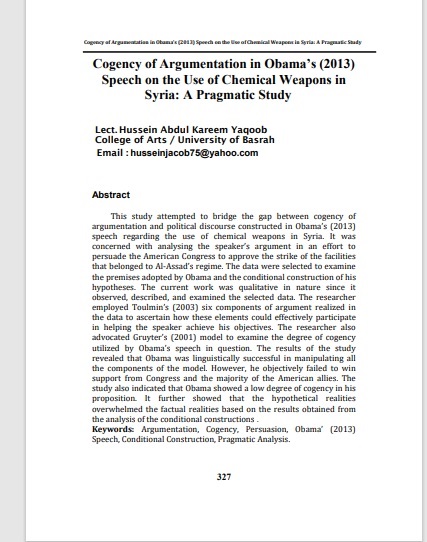Cogency of Argumentation in Obama’s (2013) Speech on the Use of Chemical Weapons in Syria: A Pragmatic Study
Main Article Content
Abstract
This study attempted to bridge the gap between cogency of argumentation and political discourse constructed in Obama’s (2013) speech regarding the use of chemical weapons in Syria. It was concerned with analysing the speaker’s argument in an effort to persuade the American Congress to approve the strike of the facilities that belonged to Al-Assad’s regime. The data were selected to examine the premises adopted by Obama and the conditional construction of his hypotheses. The current work was qualitative in nature since it observed, described, and examined the selected data. The researcher employed Toulmin’s (2003) six components of argument realized in the data to ascertain how these elements could effectively participate in helping the speaker achieve his objectives. The researcher also advocated Gruyter’s (2001) model to examine the degree of cogency utilized by Obama’s speech in question. The results of the study revealed that Obama was linguistically successful in manipulating all the components of the model. However, he objectively failed to win support from Congress and the majority of the American allies. The study also indicated that Obama showed a low degree of cogency in his proposition. It further showed that the hypothetical realities overwhelmed the factual realities based on the results obtained from the analysis of the conditional constructions
Article Details

This work is licensed under a Creative Commons Attribution-ShareAlike 4.0 International License.
References
Admoko, S., Suprapto, N., Deta, U. A., Achmadi, H. R., & Hariyono, E. (2021, March). Using Toulmin’s Argument Pattern Approach to Identify Infodemics in the Covid-19 Pandemic Era. In Journal of Physics: Conference Series (Vol. 1805, No. 1, p. 012011). IOP Publishing.
Al-Juwaid, W. R. H. (2019). the pragmatics of cogent argumentation in British and American political debates. Cambridge Scholars Publishing.
Al-Ka’bi, A. G., (2019). Argumentative indicators in some of Chomsky’s political discourse: A pragma-dialectical study. [Unpublished doctoral dissertation]. University of Basrah.
Ary, D., Jacobs, L. C., Sorensen, C. K., Walker, D. A., & Razavieh, A. (2010). Defining and designing qualitative research. Introduction to Research in Education. https://doi. org/10.1017/CBO9781107415324, 4.
Aschale, A., & Ababa, A. (2013). A critical discourse analysis of Barack Obama’s speeches vis-A-vis Middle East and North Africa. [Unpublished doctoral dissertation]. University of Addis Ababa.
Benoit, W. (2007). Communication in Political Campaigns. New York: Peter Lang Publishing, lnc
Creswell, J. W. (2013). Qualitative inquiry and research design: Choosing among five approaches. (3rd ed.). Sage publications.
Eemeren, F, H., and Grootendorst, R. (2004). A systematic theory of argumentation: The pragma-dialectical approach. Cambridge University Press.
Faris, A.A. (2021). Trump’s discourse on Iran nuclear deal: A critical
study. Misan Journal of Academic Studies. 20 (40), 48-81.
Fitria Ningsih, O. (2019). An analysis on Barack Obama’s speech viewed from grammatical cohesion [Unpublished doctoral dissertation]. University of Bengkulu.
Freeley, A. J., and Steinberg, D. L. (2013). Argumentation and debate. Cengage Learning. Tashakkori, A., and Teddlie, C. (Eds.). (2010). Sage handbook of mixed methods in social and behavioral research. Sage publications.
Gass, R. H., & Seiter, J. S. (2018). Persuasion: Social influence and compliance gaining. Boston M.A: Pearson Custom.
Gruyter, W. (2000). Language typology and language universals. London: Cambridge University Press.
Hasan, R. (2018). The Myth of the Red Line: An international relations analysis of the Obama administration’s argumentation for and against a military intervention in Syria. [Unpublished master thesis]. University of Lunds.
Indah, R. N., & Khoirunnisa, A. (2018). Argumentative statements in the 2016 presidential debates of the US: A critical discourse analysis. JEELS (Journal of English Education and Linguistics Studies), 4(2), 155-174.
Johnson, R. H. (2000). Manifest Rationality: A Pragmatic Theory of Argument. New Jersey: Lawrence Erlbaum Associates Publishers.
Martinich, A. P. (2016). Authorization and representation in Hobbes’s Leviathan. The Oxford Handbook of Hobbes, 315-38.
Merriam, S. B. (2009). Qualitative research: A guide to design and implementation. San Francisco, CA: Jossey-Bass.
Perloff, R. M. (2003). The Dynamics of Persuasion. Communication and Attitudes in the 21st Century. Mahwah, N.J.: Lawrence Erlbaum Associates.
Pita, R., & Domingo, J. (2014). The use of chemical weapons in the Syrian conflict. Toxics, 2(3), 391-402.
Poggi, I. (2005). The goals of persuasion. Pragmatics & Cognition, 13(2), 297-335.
Quasthoff, U. (1978). The uses of stereotype in everyday argument. Journal of pragmatics, 2(1), 1-48.
Telhami, S. (2013). Arab Perspectives on Iran's Role in a Changing Middle East. Wilson Center.
Toulmin, S. E. (2003). The uses of argument. Cambridge: CUP
van Eemeren, F.H. (2015). Reasonableness and Effectiveness in Argumentative Discourse. Amsterdam: Springer International Publishing
Virtanen, T., & Halmari, H. (2005). Persuasion across genres: Emerging perspectives. In Halmari, H. & Virtanen, T. (Eds.), Persuasion Across Genres: A Linguistic Approach (3–24). Amsterdam: John Benjamins Publishing Co
Voloshchuk, I., & Usyk, G. (2018). Argumentation in Political Discourse: Semantic, Composition and Stylistic Register. Humanities and Social Sciences Review, CD-ROM. ISSN, 2165-6258.
Wrobel, S. (2015). Logos, Ethos, Pathos. Classical Rhetoric Revisited. Polish Sociological Review, 191(3), 401-421.
Websites
https://www.bbc.com/news/world-middle-east-45586903
https://edition.cnn.com/2017/04/07/politics/obama-syria-airstrikes-trump/index.html
